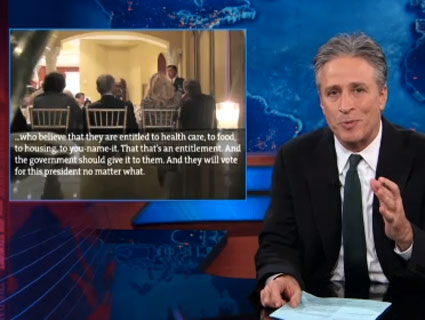
Wang Lei/Xinhua/ZUMAPress
Mitt Romney, it seems, will forever be explaining the 47 percent video—partly because he cannot admit he believed what he said.
In an interview with Chris Wallace of Fox News that aired on Sunday, Romney was once again asked about the video Mother Jones revealed last September. Here’s the exchange:
Wallace: George Will said you’ve got a problem when voters don’t like you. You’ve got a real problem when voters think you don’t like them.
Romney: Yes, it was a very unfortunate statement that I made. It’s not what I meant. I didn’t express myself as I wished I would have. You know, when you speak in private, you don’t spend as much time thinking about how something could be twisted and distorted and—and it could come out wrong and be used. But, you know, I did. And it was very harmful. What I said is not what I believe. Obviously, my whole campaign—my whole life has been devoted to helping people, all of the people. I care about all the people of the country. But that hurt. There’s no question that hurt and did real damage to my campaign.
You might recall that when the video was first posted Romney’s campaign issued a statement claiming he wanted “to help all Americans” and that he was “concerned about the growing number of people who are dependent on the federal government.” This was no denial—and no complaint that he had been taken out of context. Later that same day, Romney himself dismissed the video as “a snippet” (which it wasn’t). Asked about the private remarks at a press conference, he said, “Well, um, it’s not elegantly stated, let’s put it that way. I’m speaking off the cuff in response to a question, and I’m sure I can state state it more clearly in a more effective way than I did…But it’s a message which I’m going to carry and continue to carry.” This was widely regarded as a doubling down. Two weeks later—following his successful first debate against President Barack Obama—Romney, during an interview with Sean Hannity, had another spin on his 47 percent tirade:
Well, clearly in a campaign with hundreds if not thousands of question and answer sessions, now and then you’re going to say something that doesn’t come out right. In this case I said something that’s just completely wrong. And I absolutely believe however that my life has shown that I care about the 100 percent and that has been demonstrated throughout my life. This whole campaign is about the 100 percent. When I become president it’ll be about helping the 100 percent.
So now he was accepting and acknowledging he had been “completely wrong,” though insisting he had misspoke.
Yet with Wallace, Romney was playing the victim, claiming his “unfortunate” comments had been “twisted and distorted”—and done so because he had dared to speak candidly in private.
All of Romney’s defenses—whether or not he was admitting wrong—are undone by his own words. Let’s go to a transcript. Here’s the full exchange, which began with a question from a donor who had paid at least $50,000 to attend the behind-closed-doors fundraiser:
Audience member: For the last three years, all everybody’s been told is, “Don’t worry, we’ll take care of you.” How are you going to do it, in two months before the elections, to convince everybody you’ve got to take care of yourself?
Romney: There are 47 percent of the people who will vote for the president no matter what. All right, there are 47 percent who are with him, who are dependent upon government, who believe that they are victims, who believe that government has a responsibility to care for them, who believe that they are entitled to health care, to food, to housing, to you name it. That that’s an entitlement. And the government should give it to them. And they will vote for this president no matter what. And I mean, the president starts off with 48, 49, 48—he starts off with a huge number. These are people who pay no income tax. Forty-seven percent of Americans pay no income tax. So our message of low taxes doesn’t connect. And he’ll be out there talking about tax cuts for the rich. I mean that’s what they sell every four years. And so my job is not to worry about those people—I’ll never convince them that they should take personal responsibility and care for their lives. What I have to do is convince the 5 to 10 percent in the center that are independents that are thoughtful, that look at voting one way or the other depending upon in some cases emotion, whether they like the guy or not, what it looks like. I mean, when you ask those people…we do all these polls—I find it amazing—we poll all these people, see where you stand on the polls, but 45 percent of the people will go with a Republican.
The key to understanding Romney’s remarks fully is the question. The query was predicated on the assumption embraced by many conservatives that a good number of Americans are lazy no-goodniks who don’t fend for themselves. As you know, Romney, who once was a metrics-driven businessman, then delivered a coherent response in which he turned the underlying assumption into a specific fact: 47 percent—those people who receive any government benefits—do not “take personal responsibility and care for their lives.”
Here was a politician giving a direct answer to a specific question. What was twisted?
In his interview with Wallace, Romney claimed, “What I said is not what I believe.” Yet that is not how he first responded to the clip.
Romney’s 47 percent comment was no slip or an accidental misstatement. After the election was over, a fellow reporter told me that she had recently attended a dinner with several top GOP fundraisers. A key topic at the table that night was Romney’s comment that he had lost because Obama had doled out “gifts” to African Americans, Latinos, and young voters. That statement was seen by many as a bookend to the 47 percent remark, and the conversation naturally moved to the video. Several of the GOP funders mentioned that they each had heard Romney make similar 47 percent-ish comments in private during the campaign.
The response captured by my source at the Boca Raton fundraiser was not an outlier moment for Romney. Romney’s words were not subsequently distorted. And his ever-shifting and hollow explanations will mark him as a person who cannot take full responsibility for one of the most consequential statements he ever uttered.








